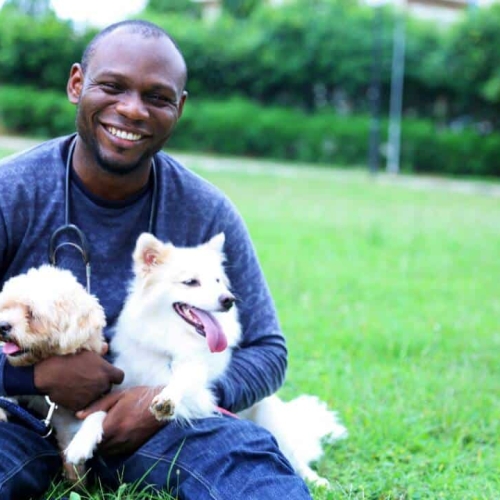
Sunday Agbonika
Sunday Agbonika holds a DVM from Ahmadu Bello University and a Certificate as a Human Animal Intervention Specialist (CHAIS) from Oakland University. He is the founder of Dogalov HumAn Support Initiative, a non-profit that is shaping the future of Human Animal Interactions in Africa and currently hosts the only annual HAI Conference in Africa, which usually attracts hundreds of participants across Africa and beyond.
Through this non-profit, he is committed to enriching human lives in Africa through positive human-animal interactions or experiences.
Sunday is currently enrolled for a Masters Degree in Animal Welfare and Behaviour with the University of Pennsylvania
Presentation
This panel discussion, led by Michael Kaufmann, looks at how the aging of people is approached differently in different parts of the world and that contact with companion animals varies, influenced by factors such as culture, family structure, perception of aging. There are examples of programs and also adaptations of how animals fit into older people’s lives and can add quality in different ways.
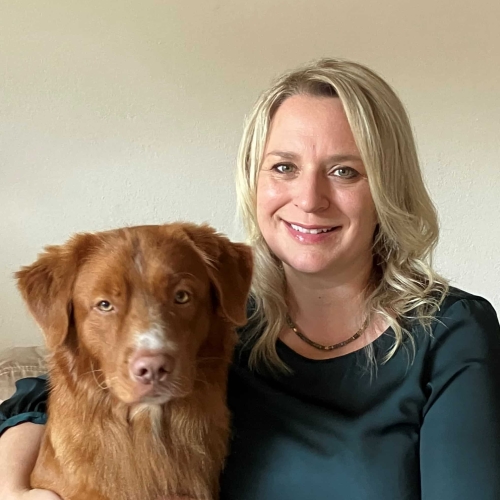
Dr Andrea Beetz
Andrea Beetz, M.A. Psychology, Ph.D., works as professor for special education at the IU International University of Applied Sciences, Erfurt, Germany. Her research focuses on animal-assisted education, AAI for clients with PTSD, theories and mechanisms of HAI and AAI and the application of attachment theory to the human-animal relationship.
Presentation
The International Society for Animal-Assisted Therapy (ISAAT) is an accreditation organization which set standards for institutes offering education in AAI. With currently 28 member institutes with accredited curricula ISAAT focuses on the quality of training programs for professionals in AAI and basic training for human-dog dyads, based on content of the curricula and adherence to the IAHAIO White Papers and Declarations.
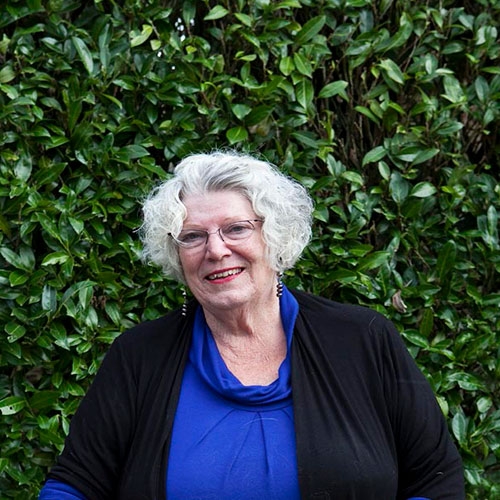
Prof Dr Marie-Jose Enders-Slegers
Marie-Jose Enders-Slegers, PhD was Professor in Anthrozoology at the Faculty of Psychology and Educational Sciences at the Open University in Heerlen, the Netherlands between June 2013 and September 2022. She successively obtained her Doctoral Diploma Psychology (1990) at the University of Utrecht; a Doctorate (PhD) in Psychology (2000); a Diploma Health Care Psychologist (2001), Certificates Basic- and Senior Lecturer (2003) at the Utrecht University and until now numerous post doctorate courses for further qualifications in research and clinical psychology. She specialized in human-animal interactions. Her research is focused on the development of human animal relations and the meaning of human-animal interactions for vulnerable people (e.g. elderly, elderly with dementia, traumatized children, people with mental disabilities, children with psychiatric disorders, autistic children, and psychiatric patients) and on the link between domestic violence and animal abuse. Furthermore, she was founder and is nowadays adviser of AAIZOO (Animal Assisted Interventions in Zorg (Care), Onderzoek (Research), Onderwijs (Education); is Founder and Board member of The Circle of Violence in the Netherlands, is Fellow at the Denver University; has been member of the Expert Advisory Group Sociology of the CALLISTO project of the European Union (until 2016), is founder and board member of IVA, (Institute for Anthrozoology in the Netherlands) and is boardmember (ex officio) of ISAZ (International Society of Anthrozoology), is on the advisory council of Green Chimneys, Brewster, N.Y. and is an ISAZ Fellow. She still is involved in several research projects at the Open university.
Presentation
We are living in an aging world in which people get older and older thanks to better life conditions and better healthcare. As there are already more people over 65 year than children under 5 year in our world it is important to realize that the amount of younger people, caring for the elderly, will decrease over time while the need for (long-term home) care and long-term institutional care will increase. The World Health Organization advised societies to realize ways for the elderly to maintain their independency and quality of life fostering the abilities of older people in age friendly environments. In this vision pet-ownership fits wonderfully. Research showed that human-animal interactions in pet-ownership or in animal assisted services offer many benefits to older people. In this talk we discuss the economic and health benefits of pet-ownership at old age as well as challenges of companion animal interactions for animals as well as for the aged people. Animal Alternatives for pet-ownership will also be addressed.

Ellen Groneman
Ellen Groneman lives in the Netherlands and has been director of the OOPOEH Foundation for 4 years. Her main tasks are taking care of a strategic plan, fundraising, national media and managing the team. Before OOPOEH she worked at other social organizations in the social domain and before that she worked for a long time in a corporate business environment.
Presentation
The OOPOEH foundation’s mission is to combat loneliness of elderly people. They do this by matching seniors with dog-owners (and their dogs). They focus on seniors who love dogs but don’t want the fulltime care anymore but miss the company, walks and chats with other dog owners and neighbours. In particular, elderly who lost their partner, or their own precious dog, and who are still living independently have proven to be attracted to OOPOEH. The seniors, we call them OOPOEH’s get out more, make new friends and adjust to a healthier lifestyle. Since we were founded in 2012 we have made more than 7000 matches and the social impact is big and proven.”
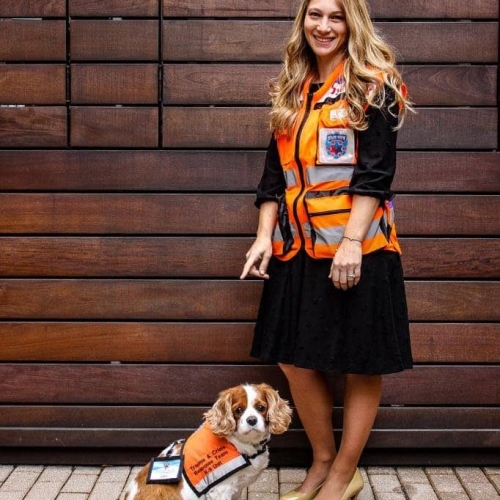
Dr Batya Jaffe
Dr Batya Jaffe is an Adjunct Professor of Social Work at the Wurzweiler School of Social Work at the Yeshiva University of New York, where she teaches a variety of social work courses specializing in trauma. In addition, she is a graduate Animal-Assisted Therapist from the Hebrew University of Jerusalem, Israel. She also has a degree in Special Education from Bar-Ilan University in Israel. Her doctoral dissertation is from Yeshiva University, where she researched Animal-Assisted Crisis Response in Israel. She has published numerous articles and has presented her work multiple times in different settings.
Dr Jaffe specializes in her work in Israel and the U.S. pertaining to various organizations and in collaboration with different universities. She founded the K-9 Unit in Israel’s United Hatzalah, a non-profit organization that attends crisis at the moment of the crisis and provides mental health intervention with her dog Lucy. Dr. Jaffe is also a certified canine handler with HOPE Animal-Assisted Crisis Response. She and Lucy have passed extensive evaluation and training that prepares the team to attend to chaotic crises and disasters. Under this work, she and Lucy provide Psychological First Aid and comfort to those undergoing the crisis. Together, they have responded to numerous scenes worldwide, including national crises in Israel, the Surfside building collision, and more.
Dr Jaffe and Lucy worked in a nursing home for six years until they moved country. Since then, they have volunteered numerous times in different nursing homes and settings to provide Animal-Assisted Interventions.
Presentation
Providing animal-assisted interventions to aging people requires creativity, persistence, and patience. Planning requires being attentive to all beings in the setting and a mixture of knowledge and experience. This program will explore tips for providing animal-assisted services for aging people in institutions.
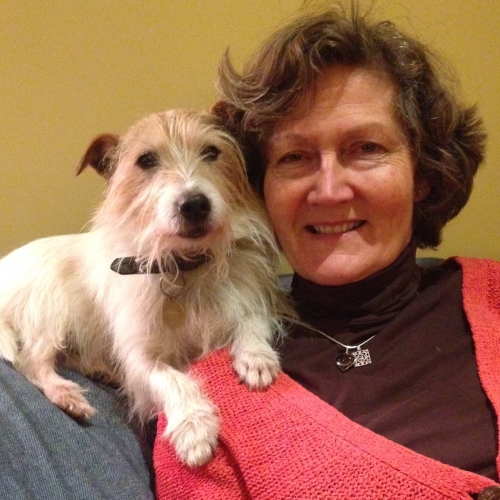
Dr Bin (Belinda) Johnston
Dr Bin (Belinda) Johnston MA VetMB MRCVS founded and runs the Suffolk, UK charity, ‘Our Special Friends’ www.ourspecialfriends.org providing animal companionship support services to people experiencing vulnerability who have a love of animals.
After graduating from Cambridge Vet School, Bin was a founder partner of a London clinic before marriage took her to Suffolk. Studying person-centred counselling skills and her volunteering for Cruse (human bereavement) and the Samaritans developed her passionate interest in bereavement training and the need for multidisciplinary community support for people and animals experiencing vulnerability to ensure their welfare needs are identified and met. She founded and runs the Suffolk, UK charity, ‘Our Special Friends’ providing animal companionship support services and developing the new role of an animal companionship practitioner.
Presentation
Our Special Friends is an innovative, grassroots charity in Suffolk, UK dedicated to helping people who love animals to keep pets in their life when circumstances put this valuable bond at risk. Their holistic range of animal companionship support services is proven to enhance mental health, reduce loneliness and isolation, increase physical health and improve connection to the community.
They support people who are experiencing times of vulnerability and where ownership of a pet, or contact with an animal, is crucial to enable them to cope. They improve health, welfare and social care through promoting, preserving and providing animal companionship and identifying unmet care needs and making appropriate referrals.
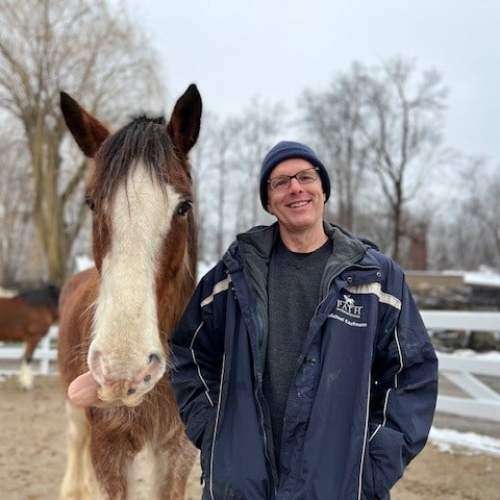
Michael Kaufmann
Michael Kaufmann is the Farm and Wildlife Director and Director of the Sam and Myra Ross Institute at Green Chimneys, dedicated to education and research on the human connection to animals and the natural world. At Green Chimneys, he directs all aspects of the nature-based therapeutic/educational programs. His focus is on Green Care, the concept of working with animals, plants and nature to enhance human environments and lives.
Kaufmann started his career as a humane educator at the American Society for the Prevention of Cruelty to Animals in New York City and continued as Education Director at the American Humane Association. Subsequently he represented Professional Association of Therapeutic Horsemanship Intl. as Director of Education and Communication and editor of the national magazine STRIDES. He has worked closely with IAHAIO committees and task forces for many years, participating in conferences, webinars and in the development of white papers.
Michael is a past member of the board of the Horses and Humans Research Foundation and was a founding board member of the Equine Facilitated Mental Health Association. He just finished two terms as a trustees of the Professional Association of Therapeutic Horsemanship International, is an advisor to the International Center for Anthrozoology, Norway, TAT Center for Human Animal Interaction, Vienna, Austria and The Canadian Institute of Animal-Assisted Interventions. He serves on the editorial board of the magazine GREEN CARE.
Michael will be leading several panel discussions at the conference.

Minal Kavishwar
Minal Kavishwar did her Masters in Clinical Psychology, from SNDT University, Mumbai, and is a specialized Animal Assisted Therapist. Mentored by renowned Animal Therapist Dr Cynthia Chandler, from University of North Texas, she pursued Animal Assisted Therapy in Counseling and Level I training in Play Therapy from University of North Texas. Minal is the only licensed International Pet Partner Team Evaluator for India and has the experience of working with human and animal teams, training them to work in the field of AAI.
Minal is instrumental in introducing the internationally-recognized professional discipline of Animal Assisted Therapy (“AAT”) in India. Apart from being the only one in India to imparts intensive training to volunteers and professional therapists (both humans and animals), she also provides consultation to set up AAT centers in India and abroad.
Minal has successfully practiced AAT over the last 14 years and impacted the lives of more than 10,000 patients with Cerebral Palsy, Autism, speech disorders, and stress induced problems such as anxiety & depression, to improve their quality of life.
Minal is also the Founder of Animal Angels Foundation, India’s first and only NGO working in the field of Human Animal Interaction and Director at Animal Angels Therapy Center, her consultancy set up. In addition to introducing and practicing AAT in leading hospitals such as Ruby, KEM, Wockhardt & Cipla Cancer Center, she has also introduced this therapy in Corporates, Schools and Airports to deal with the alarmingly increasing stress levels in people today.
Her aim has always been community involvement and bringing together humans, animals and nature. Through her foundation, she has developed a sense of compassion and service among pet owners. Through her campaign ‘Share the joy of having a pet with someone in need, she has made the community aware of pets as trained ‘working dogs’ or ‘dogs with jobs’. Other initiatives by her involve community awareness projects for ‘responsible and pet friendly scoiety’, which includes pets and strays.
All programs run by Minal are extensively documented, forming an unprecedented empirical body of research material for the Indian audience. Two of her papers have been presented at international conferences
Presentation
This panel discussion, led by Michael Kaufmann, looks at how the aging of people is approached differently in different parts of the world and that contact with companion animals varies, influenced by factors such as culture, family structure, perception of aging. There are examples of programs and also adaptations of how animals fit into older people’s lives and can add quality in different ways.
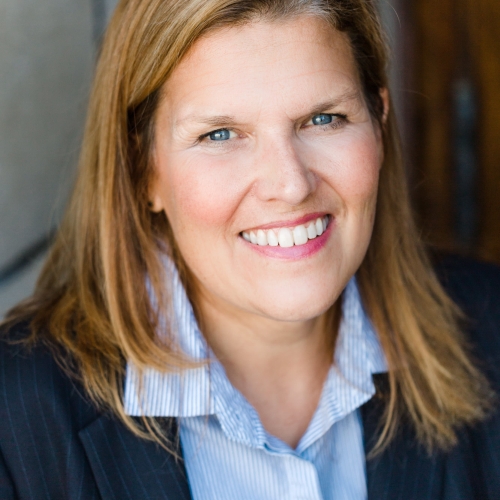
Prof Dr Betsy Kemedy
Betsy Kemeny is an Associate Professor and Chair of the Recreational Therapy Department and Animal-Assisted interventions Minor at Slippery Rock University in Pennsylvania. For 33 years, she has been a Certified Therapeutic Recreation Specialist (CTRS) with a practice specialty with older adults, working at all levels of the continuum, including a geriatric evaluation clinic, adult day care, skilled nursing, hospice, and memory care. Betsy is a Fellow Distinguished in Recreational Therapy, and a Certified Professional Gerontologist with a PhD in Leadership and Administration of Nonprofit and Public Sector, and a MS in Recreational Therapy from University of North Carolina at Chapel Hill, and a BA in Sociology from Wake Forest University. Betsy is active in the American Therapeutic Recreation Association and has served as member-at-large, secretary, and President. She has more than 30 research publications and authored the Recreational Therapy for Older Adults textbook in 2019 and second edition forthcoming. She serves as the current co-chair for the Scientific Review Board of the Horses and Human’s Research Foundation. An area of Betsy’s research interests is recreational therapy incorporating equines, with mounted and groundwork as a treatment modality, for both adolescents on the autism spectrum and older adults. Betsy is also a handler for a therapy dog, Hodge, who visits in local nursing homes.
Presentation
The research on older adults and Animal Assisted Interventions (AAI) is as diverse as the individuals who make up the group called, “older adults.” From skilled nursing facilities to community-dwelling older adults’ dog-walking patterns, the settings are equally diverse. More literature exists on the incorporation of canines in AAI and older adult research. However, in recent years, there is a growing body of research that incorporates equines. For research with an adequate level of evidence, the dosage and precise protocol of the interventions (duration, frequency, breed, setting) are important for furthering evidence-based practice.
A gap in the research exists with other species (e. g. rabbits, alpaca) and comparative effectiveness of different species with the same groups of older adults.
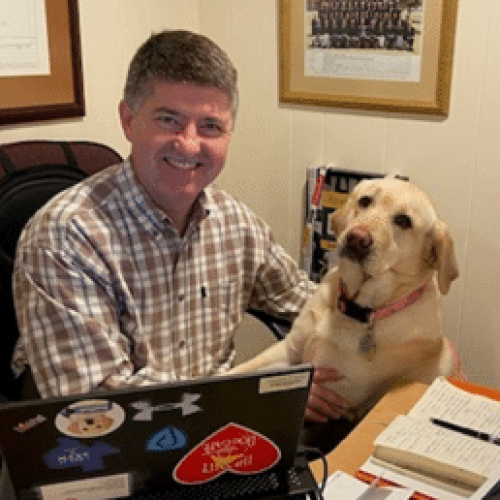
Dr Oliver Knesl
BSc, BSc (Hons), MSc, BVSc, MRCVS, CSAM
Oliver received his BVSc (Bachelor of Veterinary Science) from the Faculty of Veterinary Science – Onderstepoort, University of Pretoria, South Africa and holds BSc (Zoology, Comparative Physiology); BSc (Honours) (Wildlife Management) and MSc (Environmental Geochemistry) degrees. Oliver has worked in clinical practice in New Zealand, the United Kingdom and South Africa and is a Member of the Royal College of Veterinary Surgeons (MRCVS). He has completed additional postgraduate veterinary studies at Massey University (canine & feline endocrinology), the University of Sydney (emergency and critical care) and the University of Florida (Gainesville) (veterinary public health) and participated in post graduate programs at the Wharton School, University of Pennsylvania (marketing and strategy), and the University of Notre Dame’s Mendoza College of Business (Business Administration).
Oliver joined Zoetis from clinical practice in New Zealand in 2006 and has held various veterinary professional services, marketing, and commercial leadership roles within the US and International business currently serving as the marketing lead for companion animal pain therapeutics in the US. He has previously served two terms as Chair of the American Veterinary Medical Association steering committee on human animal interaction (SCHAI) and was a founding member of the Human Animal Bond Research Institute (HABRI) where he still serves as a member of the steering committee. Oliver also serves on the Animal Welfare Advisory Board (AWAB) for the Morris Animal Foundation.
Oliver lives in Randolph, New Jersey, with his wife, Bronwyn, and children Danielle and Ben, and yellow lab, Evie, a retired autism service dog. Oliver’s interests include the human animal bond, preventive medicine, emerging infectious diseases, wildlife medicine and veterinary military history
Presentation
The human-animal bond has the potential to positively influence the lives of people and their pets. These benefits can be even more impactful for individuals at higher risk of facing challenges to their mental, physical, and social health, including aging populations. The veterinary profession’s dedication to protecting animal welfare and promoting public health positions veterinarians as stewards of the human-animal bond.
Drs. Ng and Knesl, both experts in the human-animal bond, will provide insight into the veterinarian’s perspective on caring for older people. This presentation will include highlights in the following areas:
- Benefits and risks of pet ownership for aging people and pets
- Older adults perceive pets as important for their health and wellbeing. Care workers including veterinarians may be able to improve home care for these older adults and their pets to optimize the mutual benefit of the human-animal bond in these relationships.
- How creating a partnership in care can empower pet owners to advocate for their needs as caregivers and leverage the veterinarian’s ability to design treatment plans for the unique circumstances of each human-animal pair
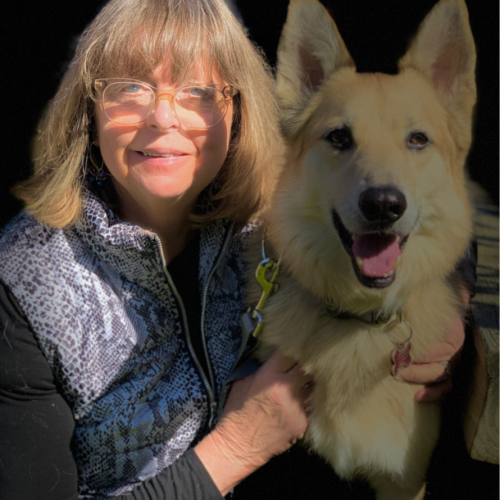
Jane Kopelman
Jane Kopelman is a dog trainer and owner of All About Dogs and Animals for Adoption. Jane started her career at the ASPCA in New York City working on the behavior helpline as well as running volunteer training workshops and classes for the general public. Appointed by the City of New York she has served on the board of ACC (Animal Care and Control) in New York City. She also served on the Board of Directors of Angel on a Leash. She has an extensive background in evaluating and training dogs.
For more than twenty years, Jane has been the owner of All About Dogs, a dog training business in New York She does private training and behavior counseling .
She is a certified therapy dog team evaluator for Pet Partners and teaches therapy dog classes in New York City as well as in upstate New York. She serves as a consultant for Memorial Sloan Kettering Cancer Center’s therapy dog program. She has evaluated and trained hundreds of therapy dog teams.. Jane has been doing pet therapy with her own dogs for more than twenty years.
Jane recently worked with Green Chimneys on a program that brings shelter dogs and special needs children together.
Jane has lectured nationally on sheltering and community outreach. She was the national director of the Training WheelsÒ shelter outreach program which was featured on ESPN’s Don’t Be Like Mike video.
Presentation
Not all therapy dogs are alike. It is important to be able to match the right therapy dog with the right job. We will explore what traits are important to look for when matching a dog with an older population. We will also look at recognizing and dealing with stress.
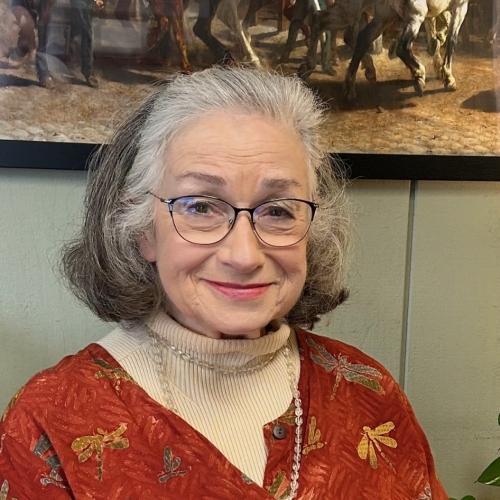
Dr Stephanie LaFarge
Now retired, Stephanie LaFarge was Senior Director of Counseling Services at the American Society for the Prevention of Cruelty to Animals, headquartered in New York. Dr LaFarge pioneered the use of psychological evaluation and intervention with adults and young people who engage in animal cruelty. She directs the New York City Family VISION Task Force that unites social service agencies, law enforcement and animal welfare organizations that share the goal of preventing animal violence.
Dr LaFarge was Adjunct Assistant Professor of Clinical Psychiatry at the University of Medicine and Dentistry in Newark, NJ.
Trained as a sex therapist, she developed an innovative curriculum for the reduction of high-risk sexual behaviours. She has also worked with AIDS patients, and as a bereavement specialist for children with terminal cancer.
LaFarge’s work with animals includes many years or surrogate mothering two infant chimpanzees, who were taught sign language in her home. As part of the New York City 9/11 Disaster response, Dr LaFarge coordinated the ASPCA role in facilitating the work of therapy dogs. Approximately 300 therapy dogs and their handlers volunteered over 1000 visits to various sites in NYC. Her own dog, Sophie, was an active participant.
Presentation
Stereotypes abound when we think of elders and animals. Images of a cat resting in the lap of an old lady or a man with dementia petting a therapy dog. It feels positive, happy and benign. But there is so much more to consider. This conversation with psychologist Dr Stephanie LaFarge will help focus on the process of aging in general, on how personal characteristics, resilience, health and past trauma can influence how we age. We will consider the layered relationships we have with animals throughout life and why meaningful community support for people and their pets is a social, medical and political challenge.
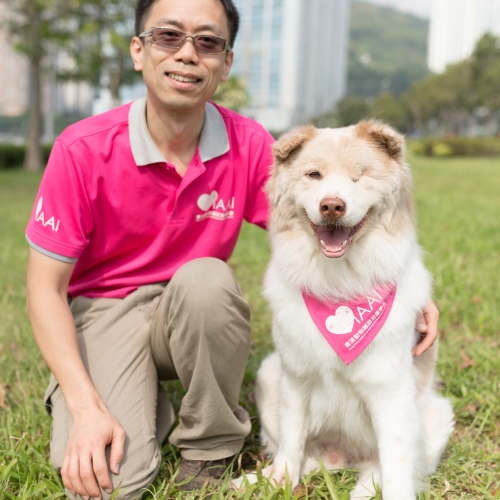
Eddie Lee
Eddie is a Psychological Counselor, a Certified Professional Dog Trainer and Behavior Consultant (CPDT-KA, CPDT-KSA, CBCC-KA), a Certified Feline Training and Behavior Specialist (CFTBS), the first Pet Partner International Team Evaluator for Hong Kong, a Biologist and a Public Health practitioner with canine-related services backgrounds (Therapy dogs and Guide dogs). He learned AAI from Oakland University and several other institutions in the UK, US and Australia.
Eddie organizes activities aimed at creating a society with equality and mutual love among humans and animals. He founded the Charitable Hong Kong Institute of Animal-Assisted Interventions (HKIAAI) and has been providing social services facilitated by accredited therapy animals. His therapeutic projects include substance use alleviation, special education needs, and autism spectrum disorders, other projects like Animal Welfare Education and Life Education are also very popular.
Eddie is the pioneer in introducing AAI academic programs into Hong Kong’s tertiary education system with the goal of raising the standard of AAI practitioners and animal welfare in Hong Kong. He is the Program Partner and an Honorary Lecturer of the Higher Diploma in Pet Care and Animal Assisted Intervention program at the Hong Kong Metropolitan University – LiPACE, the first academic award-bearing AAI program in Hong Kong. He also launched some other AAI and animals-related courses at the University of Hong Kong and the Lingnan University.
Presentation
This panel discussion, led by Michael Kaufmann, looks at how the aging of people is approached differently in different parts of the world and that contact with companion animals varies, influenced by factors such as culture, family structure, perception of aging. There are examples of programs and also adaptations of how animals fit into older people’s lives and can add quality in different ways.
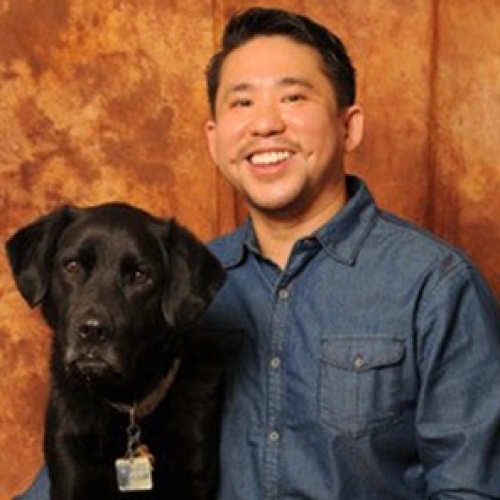
Dr Zenithson Ng
Dr. Zenithson Ng is a clinical associate professor of small animal primary care at the University of Tennessee College of Veterinary Medicine. He received his DVM from Cornell University; then completed an internship at the ASPCA, and an ABVP canine/feline residency combined with a master’s degree in human-animal bond studies at Virginia Tech. Zenny has over a decade of experience in human-animal interactions (HAI) and founded the first therapy animal program at Virginia Tech and is the veterinary adviser to the Human-Animal Bond in Tennessee (HABIT), the therapy animal program at the University of Tennessee. He researches the effect of HAI on the welfare and wellbeing of animals, investigating physiologic biomarkers and behavior in dogs to inform best practices in therapy and assistance animal work as well as responsible pet ownership.
Presentation
The human-animal bond has the potential to positively influence the lives of people and their pets. These benefits can be even more impactful for individuals at higher risk of facing challenges to their mental, physical, and social health, including aging populations. The veterinary profession’s dedication to protecting animal welfare and promoting public health positions veterinarians as stewards of the human-animal bond.
Drs. Ng and Knesl, both experts in the human-animal bond, will provide insight into the veterinarian’s perspective on caring for older people. This presentation will include highlights in the following areas:
- Benefits and risks of pet ownership for aging people and pets
- Older adults perceive pets as important for their health and wellbeing. Care workers including veterinarians may be able to improve home care for these older adults and their pets to optimize the mutual benefit of the human-animal bond in these relationships.
- How creating a partnership in care can empower pet owners to advocate for their needs as caregivers and leverage the veterinarian’s ability to design treatment plans for the unique circumstances of each human-animal pair
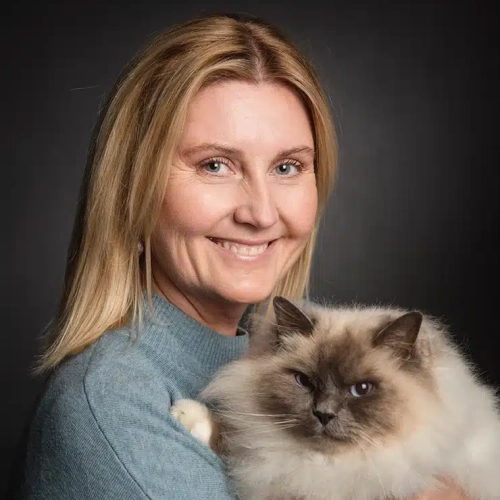
Dr Christine Olsen
Dr Christine Olsen, R&D Director at ICofA. She earned her MSc in Animal Behaviour from the Norwegian University of Life Sciences in 2006. She later completed her doctoral studies at the same institution in 2016, focusing on animal assisted interventions (AAI). Dr Olsen is both a cat and dog behaviorist, and a certified dog instructor. For several years she held the position of Felino technician at Royal Canin. Notably, she spearheaded the development of the Personality Assessment of Domestic Animals (PADA), a screening test to evaluate the suitability of animals—like cats, dogs, horses, and farm animals—for roles in AAI. Throughout her career, Dr Olsen has collaborated on numerous international projects, building a vast international network that encompasses some of the most respected figures in the AAI field. Many of these individuals are now staunch supporters of the International Community of Anthrozoology (ICofA), a global community that unites practitioners, researchers, educators, and professionals in the realm of anthrozoology.
Presentation
In this presentation, Christine will present examples of best practices when working with cats in animal-assisted interventions. This will include both cat-handler teams that visit institutions and residential cats. She will discuss the preferred characteristics for a cat in AAI, how to assess these characteristics, and how to match the cat-handler team to the client’s needs.

Dr Elizabeth Ormerod
Dr Ormerod is a retired veterinarian with a deep interest in human-animal interactions, and especially in how knowledge of the bond, animal welfare, animal behaviour and veterinary medicine can be applied to help the most vulnerable people and animals. She pioneered bond-centred veterinary practice and veterinary community outreach, introducing Animal-Assisted Services to schools, nursing homes, hospitals, sheltered housing and prisons. She is Chair of The Society for Companion Animal Studies (SCAS), is a Trustee of Our Special Friends and a past Vice President IAHAIO.
Elizabeth co-founded Canine Partners, the UK assistance dog progamme. She is a Churchill Fellow, is the recipient of the international William F McCulloch award for excellence in human-animal interactions and was UK Veterinarian of the Year 2021.
Presentation
Older people derive important documented health and social benefits from bond relationships. However, being a pet guardian can also bring significant challenges for older people. This presentation will examine housing challenges and will draw upon the presenter’s experiences from 40 years in veterinary practice, and other cases supported by SCAS. Challenges to bond relationships can be experienced when older people are ageing in place. However, when moving to supported living settings there is a very high risk of the human-animal bond being ruptured with devastating effects.
Practitioners and researchers attuned to the importance of the human-animal bond, especially for vulnerable people, are collaborating at national and international level to develop initiatives to protect bond relationships whether people are ageing in place or in supported living. Some legislation has been enacted to enable older people to keep pets. Examples of practical programmes and positive policies will be described.

Dr Vanessa Pallares
• Doctor assigned to the Medical Pediatrics service of the General Hospital “Dr. Manuel Gea González “since June 2004.
• Pediatric Private Practice- Neonatal Neurology- Early Multiple Stimulation and Neurofacilitation since December 2008
• Active binomial CÂSI, A.C. from February 2010 to the present
• Elected President and Coordination of CÂSI, A.C. (Animal Connection of Institutional Service A.C) since April 29, 2013
• Certification as an Expert and Technician in Canine Assisted Therapy (endorsed by CTAC-Barcelona) 2014
• Founding President of CENATAC A.C. (Canine Assisted Activities and Therapies Center). CTAC Partner Center Mexico City.
Presentation
Dr Pallares will describe the results of dog assisted therapy in a day centre for patients with Alzheimers.
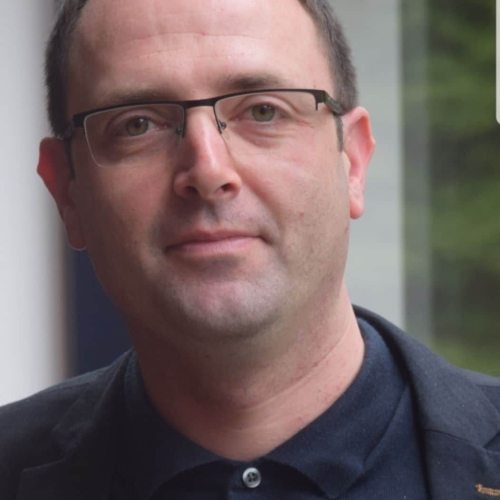
Peter Reniers
Peter Reniers is currently a PhD student at the Open University of the Netherlands, where he also completed his BSc and MSc degrees in Clinical Psychology. His current research is focused on the PET@home project, which specifically addresses the role of pets in long-term home-based care. This project has received funding from the Netherlands Organisation for Health Research and Development and involves collaboration with various organisations, including Radboudumc University in the Netherlands, UKON (Science network for elderly care in Nijmegen), the Institute of Anthrozoology, and several Dutch community care organisations primarily ‘de Zorgboog (Bakel)’ and ‘Buurtzorg (Bommelerwaard).
Presentation
Peter will be presenting the development and components of the PET@home Toolkit, designed to support community care organisations in providing support to clients receiving long-term care at home with pets. The Toolkit has several primary objectives. Firstly, foster understanding of the positive roles that pets play in the lives of individuals receiving long-term care at home. Secondly, raise awareness regarding potential challenges related to pet care and the impact of pets on caregiving relationships. Thirdly, facilitate communication between clients and care providers regarding pet-related matters, encouraging them to establish clear agreements about pet care. Fourthly, ensure animal wellbeing.
Through the PET@home Toolkit, we hope to contribute to enabling individuals who long-term care at home to continue living with their pets for longer, while simultaneously strengthening the positive and minimising the negative outcomes of the presence of pets in the context of long-term home-based care. This benefits not only the clients and their caregivers but also ensures the wellbeing of the pets involved.
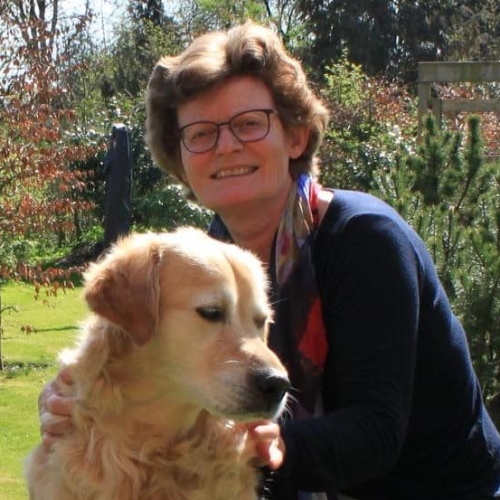
Dr Trix Rietveld
Dr Trix Rietveld is a biologist and holds a PhD in animal ethology. She gained many years of experience in policy development and public administration in the national government with respect to animal welfare in bio-industry. After this period her attention shifted to the field of animal assisted interventions with a focus on the welfare of the animals involved. From 2020 until now she is a member of the Expert Committee of the Dutch AAI Quality Register serving the accreditation of training courses in AAI and registration of individuals involving animals in health care.
Presentation
The use of animals in healthcare is increasing explosively worldwide, including in the Netherlands. It is known that the quality of the training of persons who use an animal does not always meet the needs of the clients or the animals involved. There are no legal quality standards and any volunteer or professional is allowed to involve an animal in his work. This can entail risks for both human and animal welfare. Therefore several countries developed quality standards and an accreditation process that serves to further develop and assure the professional quality of continuing education and training in the field of animal assisted intervention. Partly based upon these quality standards the Netherlands developed an online AAI Quality Register. It offers professionals, volunteers and trainers who meet the quality standards the opportunity for registration or for accreditation of training courses via the online interface.
This presentation addresses the operational approach of and experiences with the Dutch AAI Quality Register.
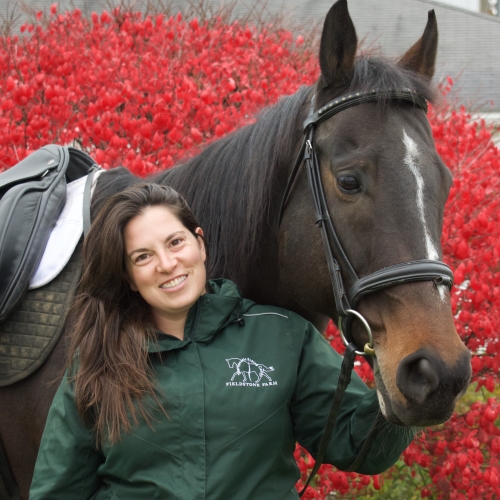
Aviva Vincent
Aviva Vincent, PhD, LMSW is a Veterinary Social Worker and co-owner of Healing Paws LLC. She is social work faculty at Cleveland State University and Program Director at Fieldstone Farm Therapeutic Riding Center. Dr. Vincent is on the board of trustees for PATH International Board of Trustees and chairs the Diversity Equity and Inclusion. She has twenty peer-reviewed publications and chapters in Career Paths in Human-Animal Interaction for Social and Behavioral Scientists, The Comprehensive Guide to Interdisciplinary Veterinary Social Work, The Handbook on Human Animal Interactions and Anthrozoology and Integrating Horses Into Healing.
Presentation
This panel discussion, led by Michael Kaufmann, looks at how the aging of people is approached differently in different parts of the world and that contact with companion animals varies, influenced by factors such as culture, family structure, perception of aging. There are examples of programs and also adaptations of how animals fit into older people’s lives and can add quality in different ways.
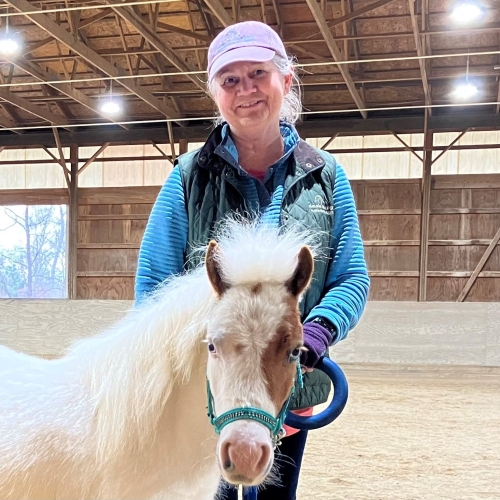
Corliss Wallingford
Co-Founder and Executive Director, Simple Changes, Lorton, VA
PATH Intl. CTRI, ESMHL, Mentor
Equines and Elders
Corliss has over 25 years in the Equine Assisted Services industry. A non-riding, horse book reading, lifelong lover of horses, she enrolled her daughter, Megan, in a therapeutic riding program in 1999. Corliss was so delighted to find a welcoming place of joy and adventure for Megan, that she soon became the first executive director of that program and learned to ride.
In 2005, she used the communication skills she honed as a 25-year veteran in the fields of marketing and public relations, to co-found Simple Changes Therapeutic Riding Center. Soon after she became a PATH Intl. Registered Therapeutic Riding Instructor and a PATH Intl. Equine Specialist in Mental Health and Learning. Simple Changes continues to enrich the lives of individuals with disabilities and their families and community by providing adaptive riding, hippotherapy, equine assisted learning and a variety of special programs to the community.
In addition to teaching adaptive riding lessons, in 2014 Corliss began holding unmounted equine assisted learning sessions for small groups of individuals with acquired brain injuries. Working with a speech pathologist, Corliss developed and implemented skill-building lesson plans to engage and motivate participants to re-gain life-skills while learning about and working with horses. Corliss began working with seniors with dementia and related issues in 2017.
Presentation
Equines and Elders is a life enrichment activity for seniors that integrates the horses of Simple Changes. Simple Changes ensures the ethical treatment of both horses and humans. The program employs non-medical, holistic methods for addressing dementia and related disorders. We integrate communications skills – both receptive and expressive language – in all activities. While enjoying equine interaction and observations, participants develop mind, body, and spirit awareness activities.
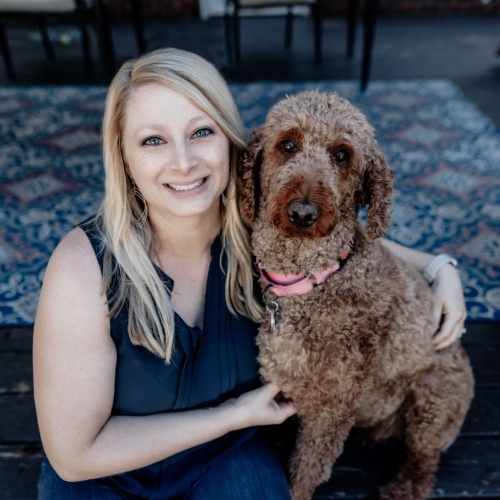
Lisa Wiborg
Lisa Wiborg is a licensed independent social worker and Veterinary Social Worker in Cleveland, Ohio. She earned her MSW from The Ohio State University and completed the post-graduate VSW certificate program at the University of Tennessee. Lisa is the project coordinator for the University of Tennessee’s Inclusive Vet Med program, focusing on improving wellbeing and increasing inclusion for veterinary students. Lisa also works as the lead social worker for Bella Care hospice where she provides support to patients and their families helping them cope with end of life. She has been using the human-animal bond in her work to bring comfort and emotional support to patients during these difficult journeys. Lisa is the co-founder of Healing Paws LLC, providing veterinary social work education and supervision to other mental health professionals. She is an active member with the Human-Animal interactions group within Ohio’s National Association of Social Workers. Lisa is also a graduate of the Robert Wood Johnson Foundation Clinical Scholars Fellowship Program, with research focused on reducing burden transfer and stress in the veterinary field utilizing Acceptance and Commitment Training. In her free time, she loves to travel with her husband and spend time with her dogs Scrabble, Lincoln, and tri-paw Pretzel.
Presentation
“Animal Assisted Therapy (AAT) in Hospice Care and Long Term Care Facilities” will define hospice levels of care and long term care settings within current organizational structures in Ohio. The presentation will describe a veterinary social worker’s perspective and activities when working as a hospice social worker along with her dog Pretzel. We will discuss positives and challenges in this type of work, along with considerations for risk management and liabilities.
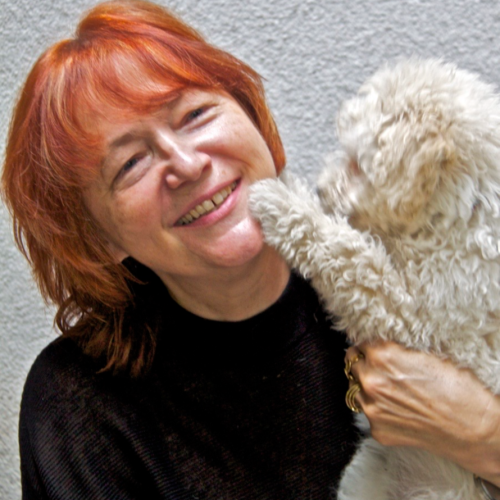
Helga Widder
President ESAAT (European Society for Animal Assisted Therapy)
Deputy Chairman and Managing Director Tiere als Therapie/TAT and Tiere als Therapie Wissenschaft – und Ausbildungszentrum/TAT-WAZ
Academically certified specialist in animal-assisted therapy
TAT operations team for more than 30 years
Vienna dog license examiner
Animal welfare qualified dog trainer
TAT animal trainer
Speaker at home and abroad
Hobbybreeder “Puli”
Presentation
In this presentation, Helga will talk about the development of the oldest European umbrella organization ESAAT (European Society for Animal Assisted Therapy) and its classification of animal-assisted work into animal-assisted interventions and animal-assisted activities. A major goal of the association is to establish a uniform professional profile of “animal-assisted intervention specialists” in Europe. The European Union has already been contacted for this purpose and has expressed fundamental interest. However, a professional profile in your own country is required beforehand.
Using the example of the recognized and successful ESAAT-certified association “Animals as Therapy” – since the association was founded, over 500,000 therapy animal visits to people with a wide variety of needs have only been carried out successfully – a project including submission for funding to the Austrian Ministry of Social Affairs is presented :
“Active and fit in old age with the help of animals” – Increasing the physical and mental health of seniors in geriatric institutions. The aim is to ensure that all geriatric institutions in Austria can make use of the offer of animal-assisted interventions and that a standard establishment in the care sector is established. This can significantly improve the quality of life of seniors.
This presentation will also address important cornerstones for high-quality implementation of health promotion projects with older people as well as necessary improvements at national and European levels. Numerous current scientific studies on animal-assisted interventions in the geriatric area will also be referenced.
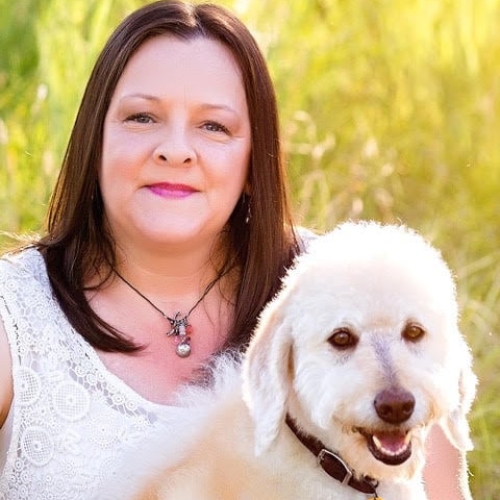
Melissa Winkle
Melissa Y. Winkle OTR/L, FAOTA, CPDT-KA is an occupational therapist and a Certified Professional Dog Trainer. She is President of Dogwood Therapy Services, an occupational therapy private practice, a dog training facility, and a continuing education provider for animal-assisted services. Melissa is a founding member and current President of the European based organization, Animal Assisted Intervention International. She develops and teaches animal assisted intervention and dog behavior coursework for University of North Florida and is a guest lecturer at several other universities. Melissa is a practitioner, a researcher, a writer and speaks internationally on disability, integrated & community based program development, animal assisted interventions, and service dogs. She has published a series of books titled Professional Applications of Animal Assisted Interventions, 4 of which are currently being revised
Presentation
Melissa will describe different avenues for gaining competency… university degree programs, university CE programs, conferences, work shops, theory versus practicum or hands on, self study tools, post professional rotations, supervision, mentoring, how to identify reputable instruction for AAA (AASP) and AAT (AATx). She will also outline tips and avenues for seeking out continuing education.

Rene van der Leest
I’ve ben a entrepreneur since 1990 and before that I worked as a nurse. My wife, Yvonne, is a nurse practioner. When we started she did some research for the best practices for people with dementia. She focused on scientific research. We bought a location and made a day program where we can implement the proven aspects. The first location we bought was located at Nijkerk. It’s a small farm with lots of animals, a garden, vegetable garden and a pond with koi.
For people with dementia it’s very important that they have daylight. In the house there is lots of daylight. And more importantly they have to go outside. Its also essential to move, to walk, cycle or do some exercise. When people with dementia do these things their mood improves and they get a better day and night rhythm. Their endurance gets better and their bones get stronger, so the bones don’t break as easily. They stay fit and healthy for longer. Reminiscence is a method to bring up memories, for example, we have books and things about the past and speak about it, we have old Dutch cows. When people see them they recognize them and it brings up memories about the past.
In the last few years there has been a lot of research about the effects of nature, on all kinds of target audience. For people with dementia nature has the effect that they go outside, to move, to have contact with each other; it is also very relaxing and their mood improves. We concluded that it is healthy!
In this presentation, I will tell you about the learning skills for people with dementia. For a long time people thought that they could not learn anything new anymore. And of course we cannot improve dementia and when we ask “what did you eat yesterday” they can’t tell us that. But, for example, when we walk the same road every day, they will learn the route and they can walk they same route by themselves. So the route we feed the animals is the same every day. There is also a daily structure that they follow so that gets recognizable. This is a way someone with dementia can learn.
Another example is if they have some personal old things in front of their door. They know that, that is their house because they can remember things from when they were younger. This is because its saved in there memories with emotion so they can remember it better.
Vision and assumptions
We translate the knowledge we have from the best practice to our assumptions. It means that we have an stimulating environment, where people can easily walk outside; they have to move if they want to feed or look at the animals. Not everything is done for them, so the people are stimulated to wash the dishes or to sweep the sidewalk.
Here, you can do anything you want, but you don’t have to. It means that we find what you want to do, to your interest en possibilities. It’s okay if you only like to walk, or read a book, or speak with other people.
We think that it is important that older people with dementia feel useful and necessary. This is possible with big things (work all day, to clean the horse stall) but also with small things, for example you put a potato in the pan, and get a compliment.
The daycare and homecare for people with dementia feels and look like home. We have old things, second-hand furniture: chairs, tables, plates etc.
And we are a home where everybody feels welcome; your family can always come inside to drink a cup of coffee.
Home care for people with dementia
From the beginning when we started with the daycare, family asked if their father or mother can come to us for homecare.
At the daycare, people are always outside; when they sit in the sun we often hear “it’s like we are on holiday!”
We thought what would be nice to go to homecare but the place feels like you’re on a holiday. At our location in Nijkerk this wasn’t possible. Here in Putten we could build a homecare.
So we build al homecare that feels like you’re on a holiday and where we do activities that gives the same feeling. As at the day care place we have gardens, animals and pets are welcome at our pace. We see that nature and animals bring joy and are very stimulating for our residence.
All the knowledge we had from research we translated to the building. We have an architect and together we made a plan. It feels like a home, with big windows, so you get daylight and a view nature or people walking past. You can sit under the veranda or easily go outside, you have to! Everyday also when it is raining the people must go from there bedroom to the main house to have breakfast.
The people who are in the homecare are further in the process of dementia than the people in the daycare.

